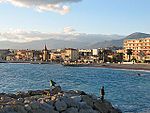Cagnes-sur-Mer
You can help expand this article with text translated from the corresponding article in French. (December 2008) Click [show] for important translation instructions.
|
Cagnes-sur-Mer | |
|---|---|
 The old village of Haut-de-Cagnes as seen from the château | |
| Coordinates: 43°39′52″N 7°08′56″E / 43.6644°N 7.1489°E | |
| Country | France |
| Region | Provence-Alpes-Côte d'Azur |
| Department | Alpes-Maritimes |
| Arrondissement | Grasse |
| Canton | Cagnes-sur-Mer-1 and 2 |
| Intercommunality | Métropole Nice Côte d'Azur |
| Government | |
| • Mayor (2020–2026) | Louis Nègre[1] (LR) |
Area 1 | 17.95 km2 (6.93 sq mi) |
| Population (2022)[2] | 52,852 |
| • Density | 2,900/km2 (7,600/sq mi) |
| Time zone | UTC+01:00 (CET) |
| • Summer (DST) | UTC+02:00 (CEST) |
| INSEE/Postal code | 06027 /06800 |
| Elevation | 0–187 m (0–614 ft) |
| 1 French Land Register data, which excludes lakes, ponds, glaciers > 1 km2 (0.386 sq mi or 247 acres) and river estuaries. | |
Cagnes-sur-Mer (French pronunciation: [kaɲ syʁ mɛʁ], literally Cagnes on Sea; Occitan: Canha de Mar) is a French Riviera town near Nice that is in the Alpes-Maritimes department, in the Provence-Alpes-Côte d'Azur region, in southeastern France.
Geography
[edit]Cagnes-sur-Mer is a town in southeastern France on the shores of the Mediterranean Sea between Saint-Laurent-du-Var and Villeneuve-Loubet. The largest suburb of Nice, it stretches along a cove offering nearly 4 kilometres (2.5 mi) of beach and is surrounded by hills, including the one of the castle, which rises to 91 metres (299 ft) above sea level.
History
[edit]The town was the retreat and final address of the Impressionist painter Pierre-Auguste Renoir, who moved there in 1907 in an attempt to improve his arthritis and remained there until his death in 1919. In the late 1920s, Cagnes-sur-Mer became a residence for many American renowned literary and art figures, such as Katie Boyle, George Antheil, and Harry and Caresse Crosby.[3][4] The Belgian author Georges Simenon (1903–1989), creator of the fictional detective Commissaire Jules Maigret, lived at 98 montée de la Bourgade in the 1950s with his third wife and their three children; his initial "S" may still be seen in the wrought iron on the stairs.
The Parisian artist, poet, and philosopher Georges Charaire had a home in Cagnes for many years. Creating his lithographs in the former studio of Paul Gauguin and also as a co-founder of the théâtre du Tertre in Montmartre, Charaire had a great influence on French art and thought in the 20th century and helped his friend Eugène Ionesco with his first plays at the théâtre du Tertre. Charaire kept his second home in Cagnes-sur-Mer until his death in 2001.
The Belarusian-French artist Chaïm Soutine created powerful and fanciful landscapes of southern France. A friend of Amedeo Modigliani, Soutine left colourful landscapes from Cagnes starting in 1924. The Spanish Fauvist painter Francisco Iturrino also lived in the town, where he died. The town may have been an inspiration for Henri-Edmond Cross (1856–1910), the Neo-Impressionist artist who painted Cypresses at Cagnes (1908).
Population
[edit]
|
| ||||||||||||||||||||||||||||||||||||||||||||||||||||||||||||||||||||||||||||||||||||||||||||||||||||||||||||||||||
| |||||||||||||||||||||||||||||||||||||||||||||||||||||||||||||||||||||||||||||||||||||||||||||||||||||||||||||||||||
| Source: EHESS[5] and INSEE (1968–2017)[6] | |||||||||||||||||||||||||||||||||||||||||||||||||||||||||||||||||||||||||||||||||||||||||||||||||||||||||||||||||||
Sights
[edit]Places of interest include Renoir's estate, Les Collettes, surrounded by olive trees; the medieval castle at le Haut-de-Cagnes; and the Cros area, which was founded by Italian fishermen in the 19th century.
The town is also known for its horse-racing venue, the Hippodrome de la Côte d'Azur, as well as for its 4 km (2 mi) beach.
Transport
[edit]The Gare de Cagnes-sur-Mer is a railway station that offers local services to Nice and Cannes.
International relations
[edit]The commune is twinned with:
Photo gallery
[edit]-
Cros-de-Cagnes
-
Landscape near Cagnes, by Pierre-Auguste Renoir
-
The Vineyards at Cagnes by Pierre-Auguste Renoir, 1908. Brooklyn Museum
-
The Grimaldi castle museum in Haut-de-Cagnes
See also
[edit]References
[edit]- ^ "Répertoire national des élus: les maires" (in French). data.gouv.fr, Plateforme ouverte des données publiques françaises. 6 June 2023.
- ^ "Populations de référence 2022" (in French). The National Institute of Statistics and Economic Studies. 19 December 2024.
- ^ Antheil, George (1952); Bad Boy of Music
- ^ A(braham) Lincoln Gillespie, Jr. Biography | Dictionary of Literary Biography. Bookrags.com. 2 November 2010. Retrieved 26 March 2013.
- ^ Des villages de Cassini aux communes d'aujourd'hui: Commune data sheet Cagnes-sur-Mer, EHESS (in French).
- ^ Population en historique depuis 1968, INSEE









